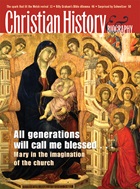Few people have called today's Christians back to the witness of the "devotional masters" more enthusiastically and consistently than Richard Foster. Author of the classic Celebration of Discipline, Foster has consistently brought us into contact with the "riches old and new" of 2,000 years of Christian spirituality. Here, Foster tells how he learned deep lessons on Christian virtues from three very different but equally "devoted" Christians.
Juliana of Norwich: Enfolded Love
I was teaching a university class in which we were reading the writings of many of the great Christians: Bernard of Clairvaux, Thomas a Kempis, Martin Luther, John Calvin, John Wesley, and more. For one particular session I innocently assigned Juliana's The Revelations of Divine Love, thinking only that it was appropriate for us to read this first book written by a woman in English. When we gathered the next week, however, I found students in an uproar. We had discussed many great writings with intelligence, reason, even good humor. But this was different. Everyone was speaking, debating, even shouting. Some loved the book, others hated it, but all were passionately engaged.
As I sought to referee the discussion, I searched for a reason for this turn of events. How could a book whose only concern is the love of God cause such intensity? It espouses no political or social agenda. It embraces no questionable doctrine. It was, I thought, an unlikely book to cause controversy.
The Revelations of Divine Love (sometimes titled simply Showings) is the mature reflection upon 16 visions that were given to Juliana on May 8, 1373 when she was 30 years of age. Our classroom controversy centered around her passionate language of love. These students were not unfamiliar with such language—contemporary movies, books, and television shows have an abundance of it—but they clearly were unaccustomed to hearing it used in Christian devotion. Juliana writes, "The Trinity is our everlasting lover, our joy and our bliss, through our Lord Jesus Christ." On another occasion she speaks of Jesus as "our clothing. In his love he wraps and holds us. He enfolds us for love, and he will never let us go." Meditating upon the passion of Christ she writes earnestly, "I desired to suffer with him."
Well, you can begin to understand the debate that was going on in the class—and in me. Is such language (and experience) appropriate for the life of Christian devotion? If not, why not? If it is appropriate, what difference should it make in the walk of faith? Our class began to realize that contemporary culture had conditioned us to think of passionate love exclusively in erotic and sexual terms. We all found Juliana illuminating many biblical passages such as the story of John—"the one whom Jesus loved"—laying his head on Jesus' breast at the Last Supper. At the same time, we found it hard to believe that this relationship of deep, holy intimacy could be right, could be true, could be ours.
That day in that classroom Juliana was freeing us to look at God's love for us and our response of love with new eyes. No longer could we view the crucifixion in detachment and endlessly debate theories of the atonement. No, she drew us near to see "the body plenteously bleeding … the fair skin … broken full deep into the tender flesh with sharp smiting all about the sweet body. So plenteously the hot blood ran out that there was neither seen skin nor wound, but as it were all blood."
No longer could we recite the Apostles' Creed as an intellectual affirmation only. Instead, those words of faith drew us close to the heart of Jesus where "praising him, thanking him, loving him and blessing him forever" became our preoccupations. These were some of the lessons Juliana taught us that day—lessons I am only beginning to learn.
Francis of Assisi: Buoyant Joy
I have found that one obstacle above all keeps people from the old writers—namely, that they are old. That obstacle never hindered me, for I had long since rejected the modern heresy of contemporaneity (i.e., if it is newer, it must be better). But I did fear one thing: I was concerned that they might corner me into a cold, heartless religion devoid of laughter and good sense. It was this very fear that led to my most unexpected and delightful discovery, and no one corrects that misconception better than the poor little monk of Assisi, St. Francis. I was simply not prepared for his buoyant joy and radiant life.
Paul Sabatier, perhaps the most authoritative biographer of St. Francis, wrote of Francis's missionary zeal, "Perfectly happy, he felt himself more and more impelled to bring others to share his happiness and to proclaim in the four corners of the world how he had attained it." Francis sent out his Brothers Minor—Little Brothers—all over Europe with the task to "revive the hearts of men and lead them into spiritual joy." He called this humble band "God's jugglers."
These 13th-century Friars Minor not only preached but also sang. With the soul of a poet, Francis would improvise their hymns. Best known is his "Canticle of the Sun" with its celebration of Brother Sun and Sister Moon, Brother Wind and Sister Water—a joyous adoration of God as the Creator of all things. In The Little Flowers of St. Francis, stories abound of how these early Franciscans were often caught up in ecstasy as they worshipped.
A joyous trust characterized their lives. Francis once gathered 5,000 friars in an open plain for something akin to a camp meeting. St. Dominic and several other prominent people had come to watch the event. Francis rose and delivered a moving sermon, concluding with the command that they not have "any care or anxiety concerning anything to eat or drink or the other things necessary for the body, but to concentrate only on praying and praising God. And leave all your worries about your body to Christ, because He takes special care of you."
Hearing this, Dominic was distressed at the seemingly imprudent order. However, within a short period of time people from all the surrounding towns began arriving, bringing with them generous supplies of food. A great feast followed as the monks rejoiced in this gracious provision of God. Dominic was so moved by the scene that he meekly knelt before Francis and said, "God is truly taking care of these holy little poor men, and I did not realize it. Therefore I promise henceforth to observe the holy poverty of the Gospel."
St. Francis and many like him have permanently marked my understanding of true spirituality, teaching me that joy, not grit, is the hallmark of holy obedience. I have found that the walk of faith is a merry abandonment to divine providence.
I hope you understand that I am not referring to the silly, superficial "joy" flaunted in modern society which produces laughter at the expense of others. No, through St. Francis and others like him we learn of a deep, resonant joy that has been shaped and tempered by the fires of suffering and sorrow—joy through the cross, joy because of the cross. Blaise Pascal once wrote in his journal, "Joy, joy, joy, tears of joy." It was the experience of Pascal, and St. Francis; it can be ours as well.
John Woolman: Compassionate Service
But joy is not the whole story. As I continued my journey with the devotional masters, they kept pushing me to expand my horizons beyond a preoccupation with myself and my own spiritual state to a concern for the bruised and broken of humanity. In an odd twist, I found that these old writers brought new insight into my understanding of contemporary social issues. And no one did this more than John Woolman.
This Quaker tailor from New Jersey in the 18th century penned a journal that remains the most contemporary of all the religious journals. The issues he pinpointed are the issues we still face today: racism, consumerism, militarism.
I gained many things from John Woolman, but by far the most important was an understanding of the profound social implications of the Christian walk. After reading his journal, I could never again separate love of God from love of neighbor, for Woolman rightly saw them as one commandment and not two. A faith that does not drive me to the hurting and bleeding of humanity is a false faith.
Woolman led a groundswell of anti-slavery conviction that assailed and eventually abolished the practice of slaveholding among Quakers. This strong social action took place nearly 150 years before the American Civil War! John Woolman had perceived the dire consequences of America's bondage to racism and oppression. "I saw a dark gloominess hanging over the Land," he wrote. If people were not willing to "break the yoke of oppression," he saw that "the Consequence will be grievous to posterity."
The combination of a gentle spirit and a tough nature permeates Woolman's journal. Out of toughness, he refused to use the products of slave labor, including sugar, and dye for clothing. Out of tenderness, he experienced "inward sufferings," knowing that his actions would distress and anger those who opposed him.
One story from the journal illustrates the kind of impact he had. On November 18, 1758, Woolman preached a powerful sermon against slavery, and afterward was taken to the home of one Thomas Woodward for dinner. As he entered the house he saw black servants and asked about their status. Upon learning that they were slaves, he quietly got up and left the home without a word. The effect of this silent testimony upon Thomas Woodward was enormous. The next morning he freed all his slaves—in spite of his wife's objections.
Woolman gave the first, small congregation I pastored a model of an all-inclusive community of loving persons. He also helped us by his example of mighty wrestling over the issue of consumerism. We were struggling with our responsibilities, obligations, and privileges as part of a highly affluent culture. Woolman dealt with very similar issues on a personal level. A businessman, a tailor, and a nurseryman, he soon found that his trade "increased every way, and the way to large business appeared open, but I felt a stop in my mind."
Woolman was not tempted by an affluent life-style. Early in his life he had, as he says, "learned to be content with a plain way of living." Rather, for him the problem was twofold. First, there was the issue of marketing items that catered to people's vanity more than they served real needs. When he sold such a product, he felt it weakened him as a Christian. The second and deciding issue was the need to be free from "cumbers" in order to give full attention to the Lord's call upon him. In the end, he decided to cut back his business, which freed him to engage in a remarkable traveling ministry.
Woolman's Plea for the Poor is a tract for our times. Addressed to affluent Americans, it asks us to tender our hearts to the needs of the poor. It includes many practical suggestions on how we can identify with the poor and needy of the earth, especially those who "labor for us out of our sight." Woolman even recommends that we take up the work of the poor for a time in order to feel their burdens.
Woolman not only warned our little fellowship of the large idolatries; he also nurtured us in the small fidelities, whether we were dealing with the problem of overcommitment or the ethics of business conduct. In all these matters Woolman taught us to have our hearts "enlarged in love."
Adapted from Richard Foster, "The Devotional Masters," in More Than Words, ed. Philip Yancey and James Calvin Schaap (Baker Academic, a division of Baker Publishing Group, 2002.) Used by permission.
All rights to this material are reserved. Materials are not to be published in other media without written permission from Baker Publishing Group.
Copyright © by the author or Christianity Today/Christian History & Biography magazine.
Click here for reprint information on Christian History & Biography.

Support Our Work
Subscribe to CT for less than $4.25/month





























